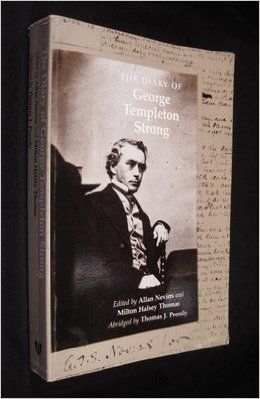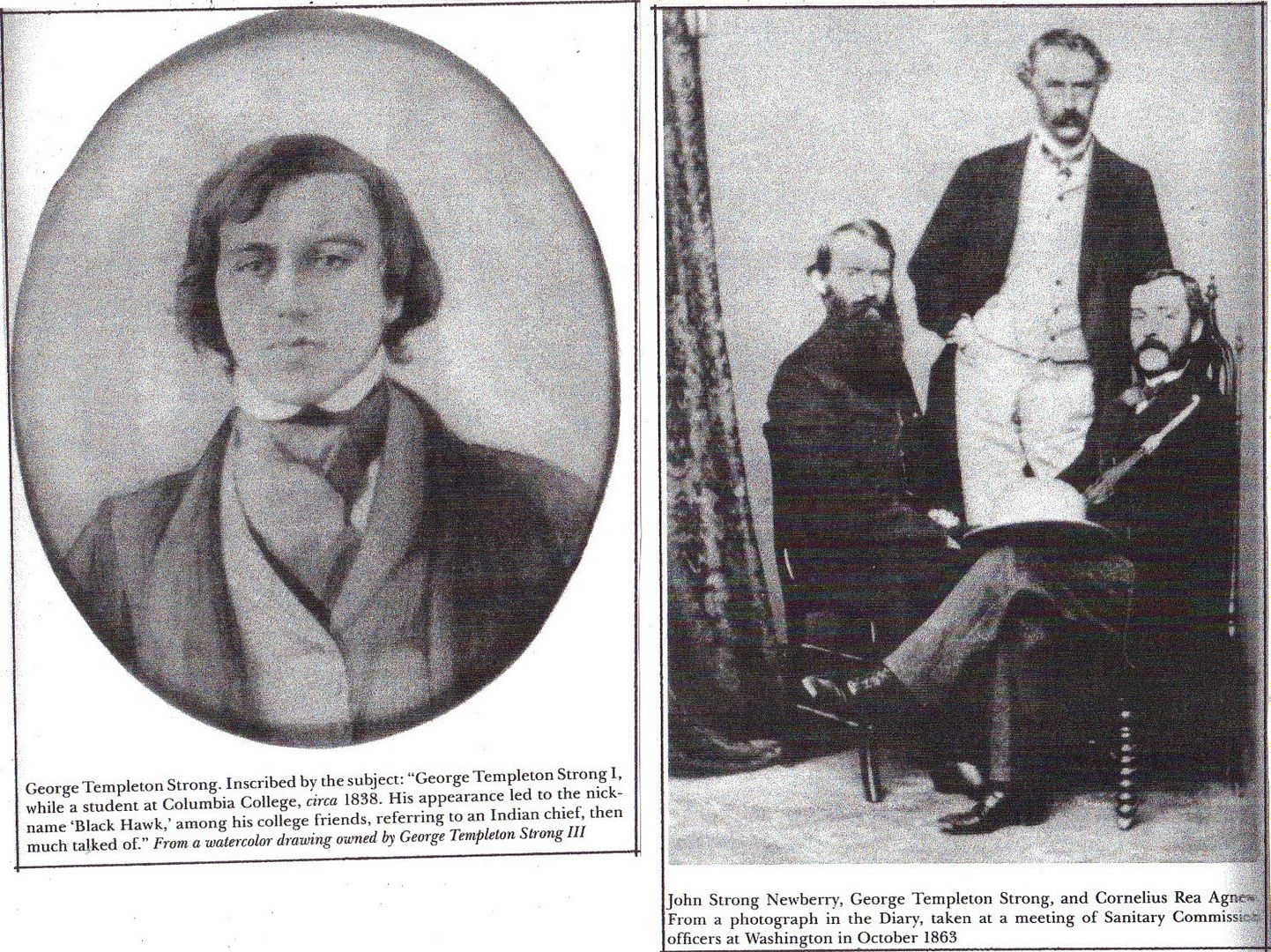To: chajin; henkster; CougarGA7; BroJoeK; central_va; Larry Lucido; wagglebee; Colonel_Flagg; Amagi; ...
New feature!

I first heard of George Templeton Strong on the Ken Burns Civil War series. His diary entries are featured throughout. It turns out he added to his diary “most days from 1835 to 1875.” I got a copy of the abridged diary from amazon and found that it is so abridged that it leaves out entire years, two of which are 1857 and 1858. That leaves me hankering to get the unabridged 4 volume set. That is kind of pricey ($200+) so it will have to wait a while as I ponder the situation. Meanwhile, I will present the surviving entries for 1856.
From the back cover:
Strong was an attorney by profession, and his diary reveals much about the practice of law in New York City, but he was also a trustee of Columbia University, a vestryman of Trinity Episcopal Church, a close follower of local, state, and national politics, and a lover of music who seems to have attended virtually every concert held in New York. His diary reflects all those interests and more. He comments on the accession of the young Queen Victoria to the British throne in 1837, just as he records the sufferings caused by the economic recessions, or his reaction upon reading Darwin’s On the Origin of Species in 1860, and his impressions when he meets Abraham Lincoln in 1862. Strong’s diary is of particular interest and value for his comments on the relations between North and South, and blacks and whites, since his changing opinions reflect closely the changing opinions of the majority of white Northern voters as registered in the elections of the era of Civil War and Reconstruction.
From the preface to the original edition (1952):
Fidelity to the text has, of course, involved the retention of many outspoken passages. Strong had a way of indulging, sometimes semi-humorously, sometimes quite seriously, in heated attacks on individuals, groups, and societies; he used the diary now and then to blow off steam. His violent assaults upon Yankees, Negroes, Southern rebels, Britons, Irishmen, Frenchmen; his scathing remarks about conservative Columbia trustees, Roman Catholics, Low-Church Episcopalians, Jews, Unitarians, Presbyterians, and other sects; his contemptuous excoriation of many of the cruder manifestations of social and political democracy – all this gives salt to the great document he left. Sometimes the salt may seem a little stinging. But if hasty and unfair judgments are included, it is not because the editors approve them, but because they have historical value. . .

After all that our first entry may seem tame and anticlimactic. Strong describes how he provided negative assurance a (as I used to call it in the CPA business) after a bank examination.
August 1. Spent most of a day in the Trust Company with Ludlow and Moses Taylor, as a Committee of Examination. All correct and prosperous as far as we could discover, but such an investigation is little more than a formality. Six months’ hard work over ledgers and vouchers might enable us to report positively that Kearny and David Thompson had not cheated the company out of $100,000 or so but no less amount of labor is of any real use.
The Diary of George Templeton Strong, Edited by Allan Nevins and Milton Halsey Thomas, Abridged by Thomas J. Pressly
4 posted on
08/01/2016 5:27:03 AM PDT by
Homer_J_Simpson
("Every nation has the government that it deserves." - Joseph de Maistre (1753-1821))
To: Homer_J_Simpson
>>Strong was an attorney by profession, and his diary reveals much about the practice of law in New York City, but he was also a trustee of Columbia University, a vestryman of Trinity Episcopal Church.
He would likely be horrified by what has become of his church. They were major logistics supporters of the Occupy Wall Street movement. Long after the occupiers were ejected by the city from Zuccotti Park, they were allowed to camp out and maintain their protest on church grounds. Long after, like a year later, IIRC. We walked by them on a trip up there.
7 posted on
08/03/2016 6:17:20 AM PDT by
FreedomPoster
(Islam delenda est)
To: chajin; henkster; CougarGA7; BroJoeK; central_va; Larry Lucido; wagglebee; Colonel_Flagg; Amagi; ...
Continued from August 1 (reply #4)
August 4, MONDAY. Our brethren of the South are surely mad. Think of the Virginian Wise telling Mrs. Ritchie (Mowatt)* who told Mr. Ruggles, who told me, that “if Fremont were elected, he would never be permitted to reach Washington.” Their brag and bluster can’t well be paralleled, unless by a Chinese edict meant to intimidate the foreign barbarians. One thing is very clear and very important, that in Kentucky and Missouri and possibly in Virginia itself, there are germs of insurrection among the “poor trash,” the plebeians who don’t own niggers. Such a movement once formed and recognized must triumph sooner or later, and nigger emancipation and the downfall of the nigger-breeding (and mulatto-breeding) aristocracy of those states must follow.
Poor Edward Curtis is dead, after two years and a half of seclusion in the Flushing Asylum, during which there has never been any hope of his restoration or material improvement.
*Henry A. Wise, governor of Virginia 1856-1860, and a man of fire-eating propensities; Anna Cora [Ogden] Mowatt, the noted actress, who in 1854 married William F. Ritchie, editor of the Richmond Enquirer.
The Diary of George Templeton Strong, Edited by Allan Nevins and Milton Halsey Thomas, Abridged by Thomas J. Pressly
20 posted on
08/04/2016 4:33:53 AM PDT by
Homer_J_Simpson
("Every nation has the government that it deserves." - Joseph de Maistre (1753-1821))
To: Homer_J_Simpson
Robert Toombs, a firebreather if there ever was one, delivered this speech to the Georgia legislature on Nobember 13, 1860, long before Sumter:
They will have possession of the Federal executive with its vast power, patronage, prestige of legality, its army, its navy, and its revenue on the fourth of March next. Hitherto it has been on the side of the Constitution and the right; after the fourth of March it will be in the hands of your enemy. Will you let him have it? (Cries of "No, no. Never.") Then strike while it is yet today. * * * Nothing but ruin will follow delay. The enemy on the fourth of March will intrench himself behind a quintuple wall of defence. Executive power, judiciary, (Mr. Seward has already proclaimed its reformation,) army, navy, and treasury. Twenty years of labor, and toil, and taxes all expended upon preparation, would not make up for the advantage your enemies would gain if the rising sun on the fifth of March should find you in the Union. Then strike while it is yet time.
Any doubt he would have struck Lincoln down had he been able to do so?
FreeRepublic.com is powered by software copyright 2000-2008 John Robinson

